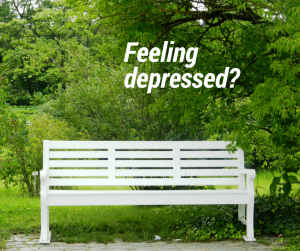
Have you ever suffered from depression? If so, you’re not alone. The World Health Organization estimates that 350 million people suffer from depression worldwide and that it is a leading cause of disability. Fifteen percent of adults will experience depression at least once in their lifetime.
Depression knows no bounds. It can impact anyone at any point in their life, regardless of age, gender, medical history, or socioeconomic status. While depression may seem like an invisible condition, there are warning signs to look for.
Signs of Depression
So, how can you tell if you or someone you know might be experiencing a major depressive episode?
A major depressive episode is defined as a depressed mood lasting at least two weeks or more. Life seems filled with darkness or heaviness, and there is a loss of interest or pleasure in almost all activities. Depression also comes with the baggage of other symptoms that can interfere with your work, school or social life. These symptoms include:
- Sleep issues -- either sleeping too much or having difficulty falling asleep
- Low energy or feeling fatigued almost every day for no reason
- Inability to focus, make decisions or think clearly
- Moving slower than usual or making unintentional motions to a degree that is noticeable by others
- Changes in weight and appetite, with an increase or decrease of more than five percent in body weight a month
- Recurring thoughts about death or suicide, a suicide attempt, or a specific plan in place for suicide
If you are or someone you know is experiencing these symptoms, it’s important to start a conversation right away, get professional help to identify the cause, and find some appropriate solutions.
What Causes Depression?
What makes depression so elusive is that there is no one single cause. Hormones, brain chemistry, family genetics, life experiences and physical health are all possible factors that can trigger a depressive episode. While some types of depression can be attributed to conditions such as Seasonal Affective Disorder (SAD) or postpartum depression, for many the source might not be immediately apparent.
Unfortunately, in many situations, doctors prefer to medicate rather than investigate, prescribing antidepressants instead of exploring the cause of the condition. Antidepressants may have their time and place, but with a myriad of possible side-effects, they are not always an option for everyone. Also, a lifetime prescription to antidepressants is only a band-aid solution that never really addresses the underlying problem.
Research shows that high levels of C-reactive protein (CRP), a marker of inflammatory disease, have been documented in subjects with depression. In fact, results from a national health and nutrition examination survey showed that subjects with depressive symptoms had CRP levels that were 46 percent higher than those of non-depressed subjects. Studies also suggest that subjects with a depressed mood have low levels of fractional exhaled nitric oxide (FeNO), which is an indication of airway inflammation.
Over time, depression can also lead to significantly more inflammation in the brain. Inflammation is our body’s response to injury or illness, and when left untreated, it can cause chronic illnesses like heart disease and potentially even neurodegenerative diseases such as Alzheimer’s and Parkinson’s. So not only is identifying the cause of depression early on important for your mental health; it's also for your long-term physical health!
This is why visiting a naturopathic doctor can be so crucial. Not only is depression a serious condition not to be taken lightly, but there are so many possible influences, that it requires a 360-degree assessment to determine what might be the cause. The first thing you need to ask yourself is "Why am I feeling depressed?" Then take it from there.
Ways to Treat Depression
For those with mild to moderate depression, there are a variety of natural options that can help fight the blues effectively, without pharmaceuticals.
1. Sunshine & Exercise
It may sound trite to suggest a little fresh air and exercise; however, you can never underestimate the value of a brisk walk in the sunshine. Activity pumps up serotonin, dopamine and endorphins, which are our feel-good happy chemicals. Go for a run to experience a true natural high.
And don’t forget, the sun doesn’t just light up the sky. It can also lighten up your mood with feel-good rays of vitamin D. Invest in a therapeutic light box for those cloudy days and winter months.
2. Create a Regular Bedtime Routine
Depression and sleep issues are intimately connected. For those who have trouble falling asleep, a nighttime routine can help ease you into a more restful slumber.
Set a regular bedtime and unplug from all devices at least two hours beforehand. Use that digital downtime time to take a bath, read a book, listen to music, meditate or unwind in any other low-key way. By eliminating sources of constant stimulation and slowing down your evening habits, you will foster a better mental environment for sleep. If you’ve been dealing with insomnia for a while, melatonin is also a helpful natural supplement to reset your internal clock.
Keep yourself on a consistent schedule by setting your alarm to go off after 8 hours. If you need a nap later in the day, then, by all means, take one, but try to resist the urge to sleep your life away.
3. Natural Supplements
Serotonin is a vital chemical and neurotransmitter. It regulates our moods, behaviour, libido, sleep, and memory. Keep your serotonin levels elevated by getting your fill of healthy omega-3 fatty acids ─ the kind you find in fish, walnuts, chia seeds, flax seeds, and more.
Cut down on coffee, which can reduce serotonin levels. Instead, try green tea which has L-theanine, an amino acid that has a relaxing effect. L-Theanine boosts neurotransmitters and helps to alleviate stress and anxiety.
Rhodiola rosea and St. John’s wort are other natural supplements that many individuals have had success with for treating depression. That said, St. John’s wort may interfere with birth control or other medications. This is why it is always important to get professional guidance on which supplements and what dose might work best for you.
4. Get Your Hormones Balanced
Our hormones have an impact on our entire bodies. They can be the reason behind depression, chronic fatigue, weight gain, and more. Think of your adrenal, sex and thyroid hormones as Jenga blocks. When certain blocks become imbalanced, it can send our whole life tumbling out of control. The longer you take to correct the imbalance, the more difficult it will be to heal. Getting your hormones tested is an easy and effective way to assess the issues so that you can effectively identify what your options are to get back into balance.
5. Talk to someone
While you may feel vulnerable or uncomfortable at first, opening up to friends and family may be the relief you need to get through dark times without feeling so alone. If you don’t feel comfortable sharing your burdens with the people you know, then seek professional counselling, whether a therapist, life coach or trusted doctor. They are there to help and can offer you a new perspective on things.
If you think you are dealing with depression or can’t shake the blues, I invite you to reach out to our clinic. Please feel free to book an appointment with us by calling or emailing us at 416-234-1888 or wellnessreception@sympatico.ca.
You don’t have to battle depression alone. We can help you get your life back!
To your best health!
Wellness Institute
References:
https://www.thelancet.com/pdfs/journals/lanpsy/PIIS2215-0366(18)30087-7.pdf
http://www.psychiatrist.com/JCP/article/Pages/2016/v77n12/v77n1221.aspx
http://ndnr.com/mindbody/case-study-herbal-treatment-of-depression/"
https://www.sciencedirect.com/science/article/pii/S0005791617300629#sec4


